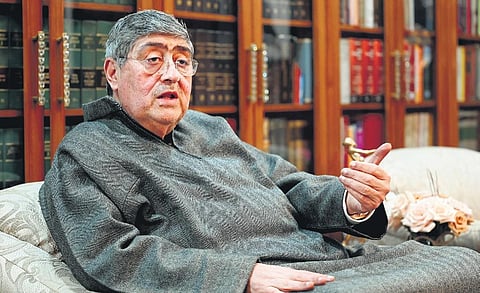Open discussion between govt & judiciary on collegium system needed: Justice Kaul
Justice Sanjay Kishan Kaul, the second senior most judge in the Supreme Court who demitted office on December 25, talks to Suchitra Kalyan Mohanty on wide-ranging issues, including his seven-year tenure, controversy over appointment of judges, long pendency of cases in various courts, and friction between the government and the judiciary. Excerpts:
You delivered some landmark judgments, including same-sex marriage and abrogation of Article 370. What’s your take?
Before pronouncing the order on Article 370, I knew that it would generate a lot of debate. It is good that people should discuss and analyse it. What I have written is the position of law and statute. This verdict is a way forward and reconciliation for the people of Jammu and Kashmir for the betterment of their lives. Fortunately, it is a unanimous verdict.
The judgment is clear on same-sex marriage. It is up to Parliament to legislate.
How difficult is it for a judge to be apolitical? At any point did you feel there were political pressures or undue interference during your tenure?
Try and understand that we judges are also human beings. Even if a judge may have some kind of political inclination or affiliation, our training teaches us justice delivery in an unbiased and impartial manner. The best example is Justice Krishan Iyer, who had a political background but his acumen in his orders were fantastic. The training what we get from our lawyer days teaches us to be apolitical.
Please mention the most difficult verdict you pronounced.
I go through all the files before pronouncing a verdict. I can’t say there is any difficulty. Litigants are not interested in our philosophy. They need justice and we have to deliver them as soon as possible. I have always tried to maintain a balance.
Is there any friction between the judiciary and the government during your tenure?
Friction is bound to happen some times. The government and the judiciary have their roles well defined and that they must ensure that there is less friction. The role of the judiciary is putting in place the checks and balances. If there is a friction, it must be for a constructive purpose.
The Collegium system of appointing judges has often been criticized. Do you think the system is impartial, whether it should continue or need modification, or an overhaul?
The Collegium system at present has the checks and balances. It was introduced in 1990 after wide discussions. The court is the ultimate arbitrator of the legal system. There must be an open discussion (not public participation or debate) by government representatives, judges and the court administration. Debate is the need of the hour.
At times, the Centre has delayed appointment of judges over a particular candidate, or asked the Collegium to decide.
The Centre must understand that it should not delay the appointment of judges, if the SC Collegium decides and recommends someone for the role of a judge. It must be followed as per the law. Finally, the ultimate beneficiary will be the litigants who move court for justice. At least 13 names for appointment are still pending. A decision must be taken as soon as possible. The Collegium recommends a name after detailed checks and balances.
At times, there have been question marks on why a certain case has been listed before a particular bench. Do you think the process of listing of cases is fair and transparent?
Judges are human beings, difference of opinion does occur. But ultimately it is the call of the Chief Justice of India who is the master of roster.
At any point, did you have difficulty in dealing with a particular case?
I am a person who takes a call. At times, I think whether some words are missing. The moment I get them, I immediately write it in my diary.
What is your take on long pendency of cases in courts? What should be done to reduce the large number?
It is an important issue and should be addressed immediately. The judges and population ratio would have to be better for a better justice delivery. We need to address a litigant’s concern that how his case from a lower court comes to the top court and why the delay. We need to address it. The court management must be there.
Do you think that the Address Dispute Resolution mechanism is a good tool for any litigant to ensure speedy disposal of cases?
I believe that countries, including the US, have less than 3% of cases go to courts. The government being a litigator must take a call on which case should continue and which one to be dropped. The government shouldn’t go for appeal in courts if it loses a case.
Do you think judges should take any post-retirement assignments?
I think judges should not take post-retirement assignments, though the choice lies with individuals. In my case, it is a no. I have already done my duty to the best of my ability.
It is often said only rich gets justice in India…
That’s not correct. If people don’t have faith in judiciary, then such a large number of cases won’t pile up in courts.

